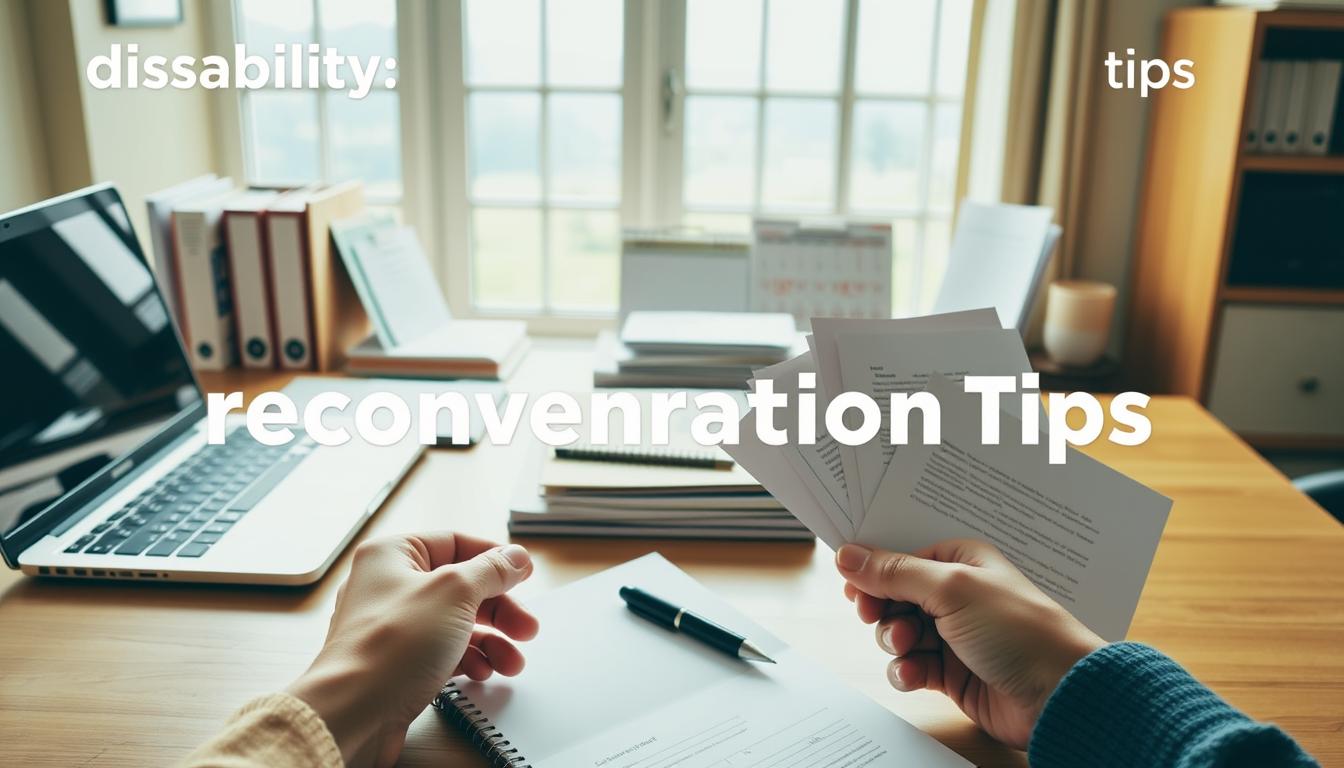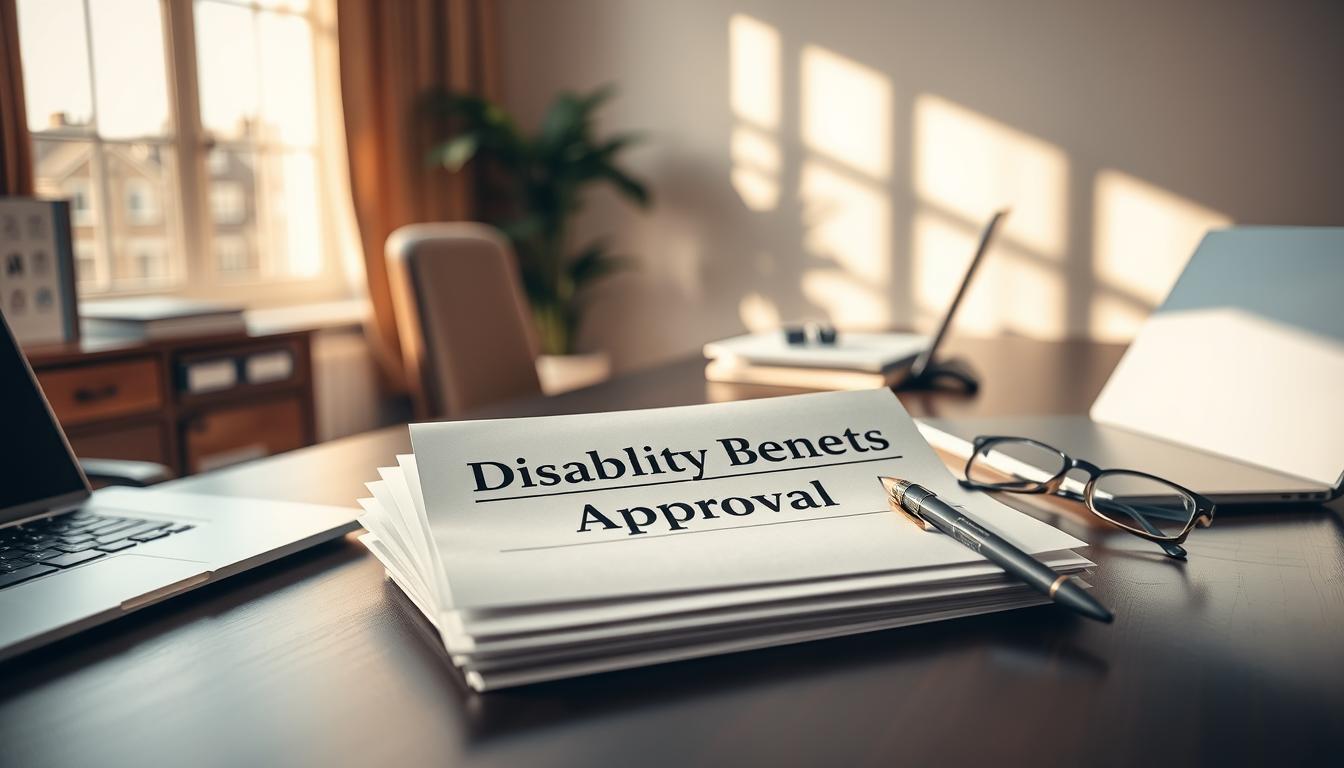Nearly 70% of disability reconsideration claims are initially denied. This leaves many applicants feeling frustrated and unsure about what to do next.
I know how tough it is to go through the disability reconsideration process. To win, you need to use the right strategies. These strategies should address the reasons for the first denial.

Effective disability appeal strategies can really help your chances of winning. In this article, I’ll share important tips to help you build a strong case.
Key Takeaways
- Understand the reasons for the initial denial
- Gather additional medical evidence to support your claim
- Develop a strong appeal argument
- Prepare for a potential hearing
- Seek professional guidance when needed
Understanding the Disability Reconsideration Process
Going through the disability reconsideration process can feel overwhelming. But, knowing what to expect can really help. This stage is the first step after your Social Security Disability claim is denied.
What Happens After Your Initial Denial
After your claim is denied, you have 60 days to ask for reconsideration. A new examiner will review your claim. This is a chance to add new medical evidence or fix any mistakes in your first application.
Key Differences Between Initial Application and Reconsideration
The reconsideration process is different because it looks at your claim again, including new evidence. It’s a deeper look at your case. This lets you add more to your claim.
Reconsideration Timeline and What to Expect
The time it takes for reconsideration can vary, but it’s usually a few months. Expect a detailed check of your medical records and work history. Being ready and knowing what to expect can help your chances of success.
| Stage | Timeline | Key Activities |
|---|---|---|
| Initial Denial | Within a few months | Receive denial notice, review reasons for denial |
| Reconsideration Request | Within 60 days of denial | Submit request for reconsideration, new evidence |
| Reconsideration Review | Several months | Thorough review of claim, including new evidence |
Why Most Disability Claims Get Denied Initially
Knowing why most disability claims are denied at first is key to winning them later. Many applicants face an initial denial. But, these can often be fixed in the reconsideration stage.
Several factors lead to initial denials. These include technical issues, missing medical records, and problems with work history and income.
Common Technical Reasons for Denial
Technical issues are a big reason for denials. These include:
- Incomplete application forms
- Failure to follow the required appeals process
- Lack of sufficient medical evidence
Completing all paperwork and following the right steps can help avoid these denials.
Medical Documentation Shortfalls
Medical records are crucial for a disability claim. Shortcomings in this area can lead to denial. Common problems include:
- Insufficient medical records
- Lack of detailed information about the applicant’s condition
- Failure to provide updated medical evidence
It’s important to provide thorough and current medical records to support the claim.
Work History and Income Issues
Work history and income can also cause denials. This includes:
- Inconsistencies in reported work history
- Income levels that are deemed too high for disability benefits
- Lack of clarity regarding the applicant’s work capacity
It’s crucial to ensure work history and income information is accurate and consistent.
Understanding these common reasons for denial helps applicants prepare better for reconsideration. This can improve their chances of success. Seeking disability denial help and knowing how to appeal a social security disability decision can greatly help.
How to Win a Disability Reconsideration: Core Strategies
To win a disability reconsideration, you need to tackle the reasons for your denial head-on. You should also add new evidence to your application. Knowing the reconsideration process well and improving your claim are key.
Addressing the Specific Reasons for Your Denial
First, understand why you were denied. Read the denial letter carefully to find out what went wrong. Issues like not enough medical proof, unclear how your condition affects work, or application problems are common. By tackling these issues, you can make your reconsideration stronger.
Building a Stronger Case the Second Time Around
To make a stronger case, collect more medical evidence. This could be new medical records, tests, or doctor statements that show how your condition affects work. Make sure your application is complete and any initial problems are fixed.
Setting Realistic Expectations and Timelines
Be realistic about how long the reconsideration will take. It can take months. Keep in touch with your application’s status and be ready to give more information if needed.
By using these strategies, you can improve your chances of winning a disability reconsideration. Focus on a solid, well-supported claim and stay active in the process.
Gathering Compelling Medical Evidence
The success of your disability reconsideration depends a lot on your medical records. A detailed medical history can really help you get disability benefits.

Types of Medical Documentation That Influence Decisions
Some medical documents are more important than others. These include:
- Detailed medical records that show your treatment history and how you’ve reacted to it.
- Diagnostic test results like MRI or CT scans that prove your condition.
- Physician statements that explain your limits and how they affect your job.
Getting Updated Medical Records and Tests
Keeping your medical records up to date and getting new tests can help. This might mean:
- Seeing your doctor for a fresh look at your condition.
- Getting new diagnostic tests to show your current disability level.
- Making sure all new evidence is included in your reconsideration.
Specialist Opinions and Their Impact
Specialist opinions can really make a difference. A specialist can give expert views on your condition, its severity, and job impact. This is key for your disability benefits claim.
By focusing on strong medical evidence, you can boost your chances of a successful reconsideration. It’s about showing a clear, detailed case of your condition’s severity and job impact.
Working Effectively With Your Doctors
Talking well with your doctors can really help your disability reconsideration. When you work well with your healthcare team, your medical records will show your true condition and limits.
How to Discuss Your Disability Claim With Healthcare Providers
It’s key to be open and honest with your doctors about your claim. Tell them all about your condition and how it changes your daily life. This helps them understand you better and write more accurate support letters.
Requesting Supportive Medical Statements
Ask your doctor for a supportive medical statement to boost your claim. Make sure the statement talks about your condition, treatment, and how it affects your work.
Ensuring Your Medical Records Reflect Your Limitations
Check your medical records to make sure they show your true condition and limits. If they don’t, talk to your doctor to get an updated record that supports your claim.
By following these disability reconsideration tips and working well with your healthcare team, you can make a stronger case for your reconsideration.
Crafting a Persuasive Reconsideration Appeal Letter
A well-written reconsideration appeal letter can greatly improve your chances of winning your appeal. This letter is key. It lets you share your side and explain why you were initially denied.
Essential Elements to Include in Your Letter
When writing your reconsideration appeal letter, include important parts. First, clearly state the decision you’re appealing and why you think it was wrong. Next, add new evidence like updated medical records or expert opinions. Explain how this new info fixes the issues from the initial denial.
Sample Templates and Formats
Using a template can help you organize your letter well. A good format has an intro, a body with your case and evidence, and a conclusion. You can find many templates online. Just make sure to tailor yours to your situation.
What to Avoid in Your Appeal Letter
When writing your reconsideration appeal letter, steer clear of some common mistakes. First, keep your tone professional and calm. Don’t repeat the same points without adding something new. Also, make sure your letter is clear and free of errors to show you’re credible.
By following these tips and writing a well-structured reconsideration appeal letter, you can boost your chances of a successful appeal. The aim is to make a strong case that addresses the initial denial and offers solid evidence for your disability claim.
The Role of Professional Representation
When you’re going through the disability reconsideration process, having a professional by your side is crucial. A disability attorney can greatly increase your chances of winning your appeal.
It’s not just about having someone to help you. It’s about having an expert in disability law. They know the process inside out.
Benefits of Hiring a Disability Attorney
Getting a disability attorney offers many advantages. They can handle complex paperwork and understand the legal side of things. They also know how to talk to the right people.
- Expertise in disability law
- Experience with the reconsideration process
- Ability to effectively present your case
When to Consider Legal Help vs. Self-Representation
Whether to get a lawyer or do it yourself depends on your case and how comfortable you are with legal stuff.
| Consideration | Legal Help | Self-Representation |
|---|---|---|
| Complexity of Case | Highly complex cases benefit from legal expertise | Simple cases might be manageable alone |
| Comfort with Legal Procedures | Attorneys are well-versed in legal procedures | Self-representation requires a good understanding of legal processes |
How Attorneys Improve Reconsideration Success Rates
Lawyers boost your chances by making sure everything is in order. They present a strong case and speak up for you.
Key strategies attorneys use include:
- Thoroughly reviewing medical records
- Preparing detailed statements
- Representing clients in hearings
Documenting Your Daily Limitations Effectively
Keeping a record of your daily activities and limitations can really help your disability claim. When you apply for disability reconsideration, showing how your condition affects your daily life is key.

Creating a Detailed Functional Capacity Journal
Keeping a functional capacity journal is a great way to track your daily challenges. It’s about logging your activities, how long you do them, and how your condition impacts your ability to do them.
For example, you might write about cooking breakfast one day but needing to rest a lot afterward because of fatigue. These details show how serious your condition is.
Using Third-Party Statements to Support Your Claim
Statements from people who know you well can really help your case. This includes family, friends, or former bosses who have seen how your condition affects you.
A family member might say how your condition has changed your daily life and work abilities over time.
Connecting Your Symptoms to Work Limitations
It’s important to show how your symptoms limit your work abilities. Explain how your condition makes it hard to do job tasks.
| Symptom | Impact on Daily Life | Work Limitation |
|---|---|---|
| Chronic Pain | Limits ability to perform household chores | Reduces capacity for physical labor |
| Fatigue | Affects ability to complete tasks without rest | Impairs sustained work activity |
| Cognitive Issues | Makes following instructions difficult | Impacts job performance and reliability |
By documenting your daily challenges well and showing a full picture of your condition, you can greatly improve your disability reconsideration claim.
Real Success Stories: Lessons from Approved Reconsiderations
The path to winning a disability reconsideration is filled with determination and strategy. Many people have found success by knowing the process and preparing well.
Let’s look at some real-life examples that show what makes appeals successful.
Case Study: Strengthening Medical Evidence
One person was denied at first because of lacking medical proof. They then collected more evidence, like expert opinions and recent medical records. This helped them win their reconsideration.
Case Study: Correcting Technical Errors
Another person was denied because of mistakes in their application. They fixed these errors by resubmitting the right forms and making sure everything was correct. Their reconsideration was then approved.
Common Factors in Successful Appeals
Success stories in disability reconsiderations often have a few things in common. These include being well-prepared, submitting documents on time, and understanding the appeals process. By learning from these approved reconsiderations, people can boost their chances of winning.
Understanding these success stories helps individuals better handle their own disability reconsideration.
Conclusion: Next Steps After Reconsideration
Getting a decision on your disability reconsideration is a big step. If you’re approved, you’ll start getting disability benefits. Knowing what to do next is key, no matter the outcome.
If you’re approved, the SSA will tell you about your benefits. They’ll give you details on how much you’ll get and when. Make sure to check this info carefully to avoid mistakes.
If you’re denied, you can appeal by asking for a hearing with an ALJ. Having a disability attorney can really help at this point. They can help you prepare, find more evidence, and speak for you at the hearing.
It’s important to stay active and informed, no matter what happens. Keep gathering medical evidence and talk often with your doctors. This can help if you need to appeal again.
FAQ
What is the disability reconsideration process?
The disability reconsideration process is a review of your initial claim denial. It looks at your case again, considering any new evidence. This helps decide if you’re eligible for disability benefits.
How long does the disability reconsideration process take?
It usually takes several months. The exact time depends on your case’s complexity and the SSA’s workload.
What are the most common reasons for disability claim denials?
Claims are often denied for technical reasons, like incomplete applications. Medical issues, like missing evidence or unclear diagnoses, are also common. Work history and income problems can also cause denials.
How can I improve my chances of winning a disability reconsideration?
To increase your chances, address the reasons for your denial. Build a strong case with good medical evidence. Work with your doctors and write a persuasive appeal letter.
What types of medical documentation are most influential in disability reconsideration decisions?
Detailed medical records and updated test results are key. Specialist opinions also matter. Make sure your records show your limitations and how they affect your work.
Should I hire a disability attorney to help with my reconsideration?
A disability attorney can be very helpful. They guide you through the process, gather evidence, and boost your chances. Consider legal help if you’re unsure or your case is complex.
How can I effectively document my daily limitations for my disability claim?
Keep a detailed journal of your daily activities. Use statements from others to support your claim. Show how your symptoms affect your work. This proves the impact of your disability.
What are the next steps after a reconsideration decision?
If approved, you’ll start getting disability benefits. If denied, you can appeal further by requesting a hearing. Knowing what’s next helps you prepare.
Can I appeal a disability reconsideration denial?
Yes, you can appeal a denial by asking for a hearing. This is the next step in the appeals process. Be ready with a strong case and good representation.
